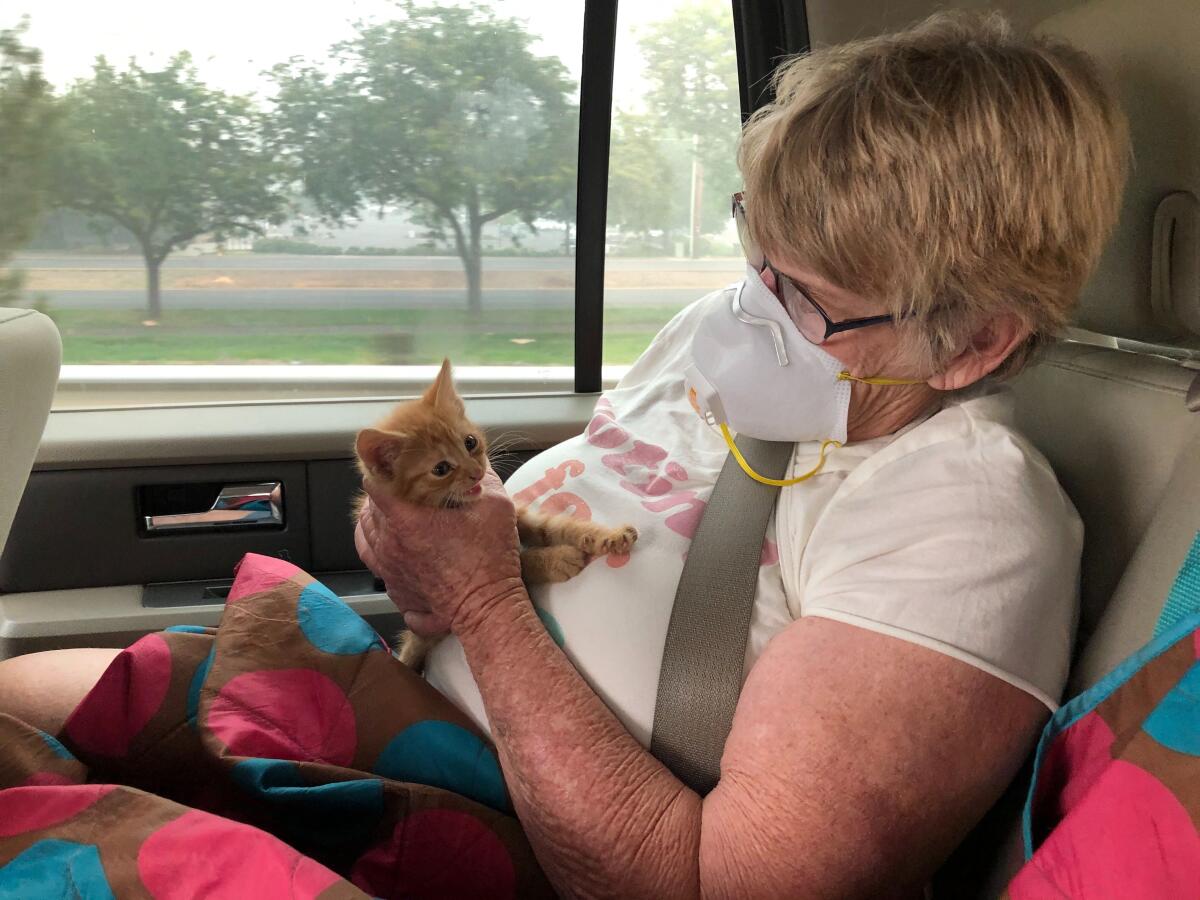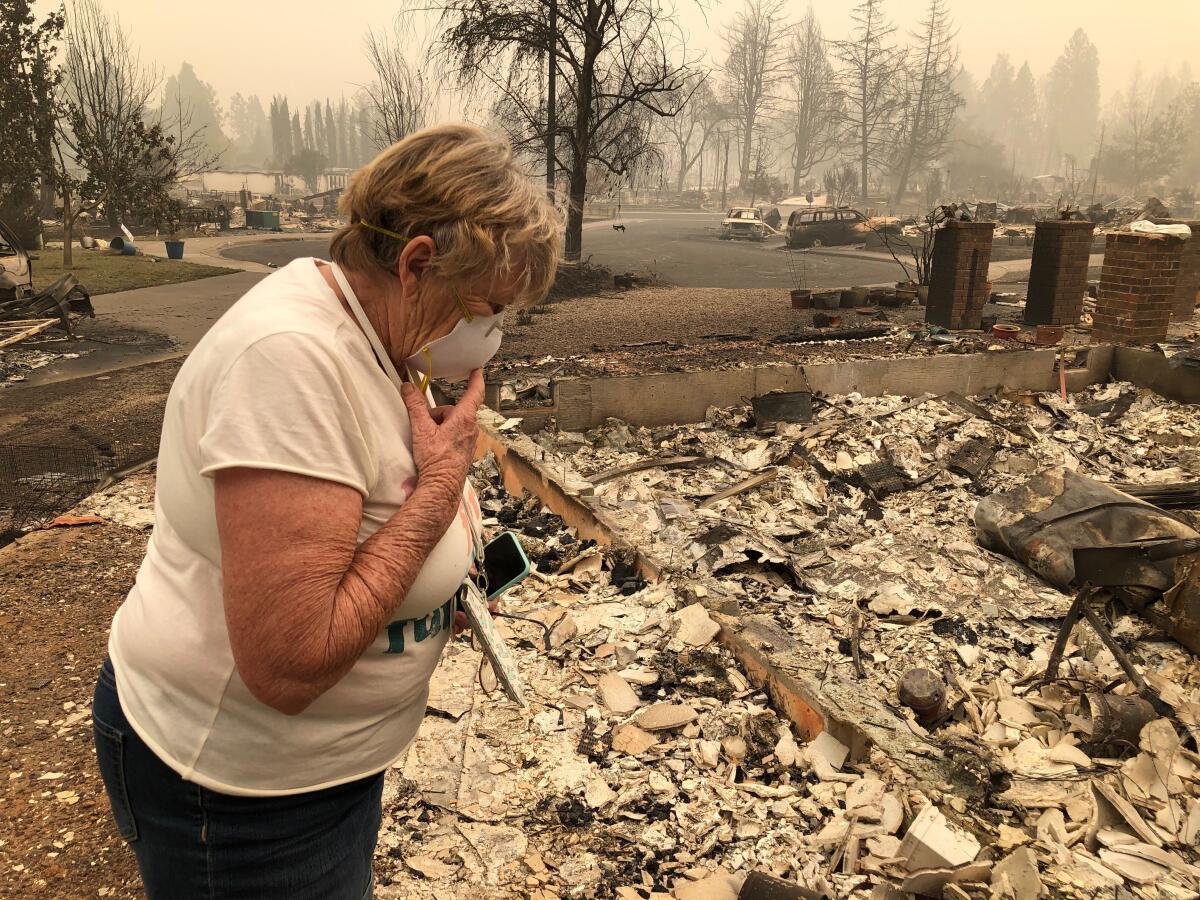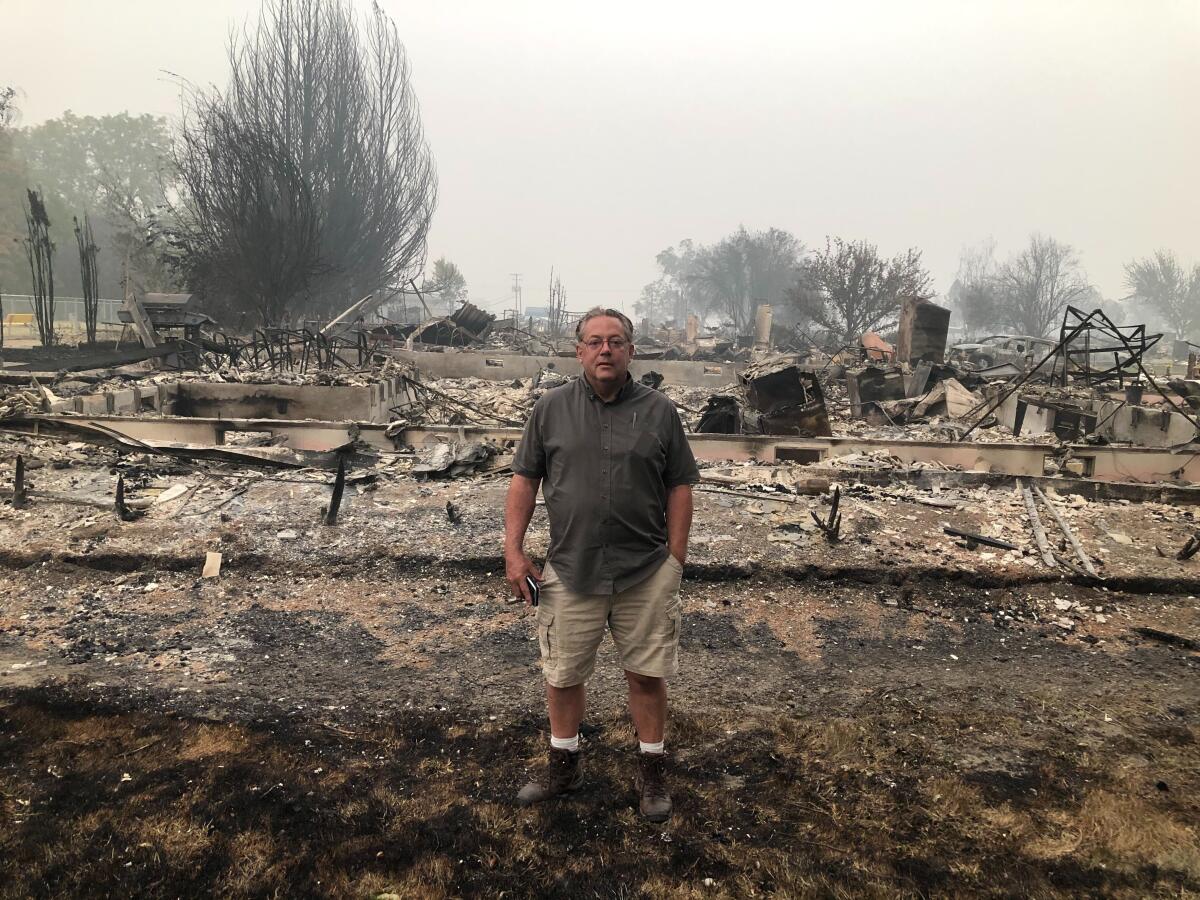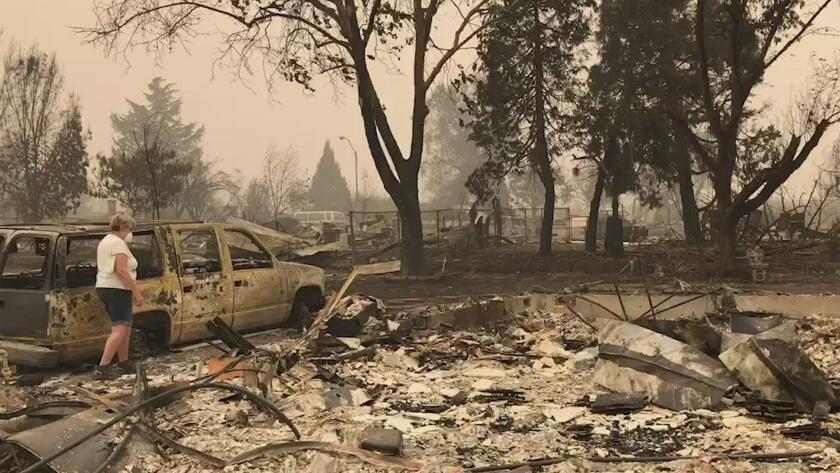Will Phoenix rise from the ashes? Deadly wildfires devastate Oregon town
- Share via
Susie McMillan, 76, returned to the remains of her home this weekend in Phoenix, Ore., where a wildfire killed at least four people and destroyed more than 1,000 homes.
- Share via
PHOENIX, Ore. — It was when she found the dead cat that Susie McMillan finally broke down.
The 76-year-old wildfire evacuee hadn’t cried at first when she returned to the smoldering ruins of Phoenix, a town of 4,500 surrounded by vineyards and fruit orchards about 25 miles north of the California state line. She kept her composure despite the fact that her hometown now resembled pictures she’d seen of war-torn Syria. Four people had died in the fire that erupted Tuesday and at least one more was still missing, the entire town treated as a crime scene as forensic crews combed debris for additional remains.

McMillan had fled with her four pets, a safe packed with vital documents, a bottle of wine and a few clothes, expecting to return within hours. Instead, it took her four days to return and sift the ashes where her home of 15 years had stood. Circling the burned-out remains of her house and two cars, McMillan — a retired medical transcriptionist and self-described “Caligonian” originally from San Jose — was excited at first to see a colorful porcelain birdbath and ceramic pots that had survived. She also found the metal water dishes she had used to feed stray cats.
“I hope they got away,” she said.
Moments later, McMillan stumbled on the blackened feline remains. Instantly, she doubled over, unsteady and sobbing. Her daughter, who had come up from the Bay Area to help, rushed over to comfort her. They suddenly realized why the sheriff’s office had wanted to escort residents back: They didn’t know what carnage remained amid the ashes.
“I can’t do this anymore,” McMillan said.

It was a sentiment shared by thousands across Oregon, Washington and California, exhausted by weeks of deadly fires that have run rampant over more than 4 million acres. Already, at least 33 people have died as wildfires cut a deadly swath through the West Coast, ten of the victims in Oregon, and authorities feared winds that fed several dozen fires last week in Oregon could kick up again, fanning the flames.
There is a chance of rain Monday that could help dampen fires and pervasive smoke, which had reduced Oregon’s air quality to the worst in the world. But Sunday, the National Weather Service issued a “red flag warning” because of potentially windy, dry weather in southern Oregon and neighboring California counties. Some areas could see gusts as high as 40 mph, and forecasters said winds would “likely contribute to a significant spread of new and existing fires.”
President Trump is scheduled to visit California on Monday to be briefed on the wildfires, which he has blamed on forest mismanagement, while Western Democrats and opponent Joe Biden have faulted climate change.
“It is apocalyptic,” Sen. Jeff Merkley, an Oregon Democrat, said Sunday on ABC’s “This Week.” “I drove 600 miles up and down the state, and I never escaped the smoke. We have thousands of people who have lost their homes. I could have never envisioned this.”
The death toll in Oregon could still rise in areas like Phoenix, where residents were forced to flee overnight on short notice from half a dozen subdivisions and mobile home parks that were gutted.

Late Sunday, 33 fires were still burning statewide, some completely uncontained. The Almeda fire in Phoenix was 60% contained late Sunday; a nearby fire was 20% contained, said Rich Tyler, a local spokesman for the Oregon State Fire Marshal’s Office.
A hazardous-materials team entered Phoenix on Sunday to address open gas lines, downed power lines and sinkholes in 40% of the burned area. Urban search-and-rescue teams from Utah and Nevada were assessing damage to buildings and searching for human remains, he said.
If fires are controlled in coming days, forensic investigators will be able to expand their search for remains, and the death toll could increase, Tyler said.
“As the hazards continue to diminish, we can get those investigators into the scene and those numbers could change,” he said.
Cynthia Schmidt Jones was among those searching for her older brother after the U.S. Army veteran refused to evacuate one of Phoenix’s destroyed mobile home parks, Bear Lake Estates. Donald Schmidt, 55, had survived a stroke and brain tumor in recent years that left him weak but still determined to protect his home, family said.
“We will find his stubborn self,” she posted on Facebook.
Her son William “Billy” Jones said the ornery handyman refused to leave with his German shepherd mix Roxy as the fire approached, even though his wife and neighbors did. The family held out hope that when sheriff’s deputies made a last pass through the area, taking holdouts to nearby Grant’s Pass, they had forced Schmidt to leave and he was stuck at a shelter, incommunicado.
But late Saturday, sheriff’s deputies arrived to deliver the news: Schmidt’s body had been found in his mobile home with that of his dog. Jones, 25, said he doesn’t think anything could have induced his uncle to evacuate.
“If there’s any way that he could have gone out, he would have still been trying to save the life he and his family had built and the families around him,” he said.
Of 185 people initially listed as missing in the Almeda fire, authorities said they had winnowed the list to one by Sunday. They were still investigating two potential points of origin of the fire and had arrested a man on suspicion of setting one of them, in brush near railroad tracks. The suspect, 41-year-old Michael Bakkela, was charged with two counts of arson, 15 counts of criminal mischief and 14 counts of reckless endangerment.
At least 1,000 houses, apartments and mobile homes had burned, Phoenix Mayor Chris Luz said. A half-dozen mobile home parks were gone, many home to seniors and low-income working families who had little notice to evacuate as late-night wind-whipped fires spread from nearby Ashland.
Most of Phoenix’s main street was consumed by the blaze, Luz said, up to 50 businesses, including Umqua Bank, Garrison’s Furniture, La Tapatia Restaurant and Puck’s Donuts. Many local businesses and homeowners cannot afford to rebuild, destroying the tax base and budget, the mayor said. For the lucky few who still have homes, utilities remained shut off Sunday, barring all but a handful from returning.
Luz’s cleaning business and home narrowly survived, his yard fence charred and surrounding neighbors’ homes destroyed. He had a generator and was camping inside with his 16-year-old son as sheriff’s deputies patrolled to scare off thieves who’d been spotted lurking in the area, including a man caught trying to crack a safe with a crowbar.
Luz said there’s no way the town, founded in 1850 and one of the oldest in the surrounding Rogue Valley, can build enough temporary housing for residents to return in coming weeks. Many homeowners and businesses were uninsured, he said, and can’t afford to rebuild.
“They’ll have to move away,” at least in the short term, Luz said as he surveyed his street, where firetrucks circled, their crews still dousing embers. “It will come back, but it will be different. It won’t be the same city.”
Retiree McMillan stayed in touch with Orchard Place neighbors via a text thread after they evacuated to hotels as she did, to a shelter in the local expo center or family homes in neighboring towns. She worried about a woman she used to buy tamales from who lived around the corner in a mobile home park, and hoped she had time to escape.
McMillan said she planned to move back as soon as she could to camp at a friend’s house in town that had survived the fire, and to rebuild.
“Phoenix, we’ll rise from the ashes, right?” she told a neighbor’s family before leaving Saturday. “We’re going to find out what community really means.”
As she walked out of the neighborhood, McMillan ran into a woman whose house was also destroyed. She was searching for her lost cat and was feeding strays. At her feet was a ravenous orange kitten. It was feisty, mewling and scrutinizing McMillan before settling into the crook of her arm. McMillan had already crammed her pet cat and three dogs into her hotel room, which her niece had dubbed “Noah’s Ark.” But McMillan decided to take the kitten too, a fellow survivor.
As she plodded slowly out of town, examining the kitten, she mused about possible names. Her favorite: Phoenix.
More to Read
Sign up for Essential California
The most important California stories and recommendations in your inbox every morning.
You may occasionally receive promotional content from the Los Angeles Times.












